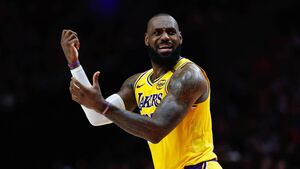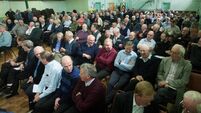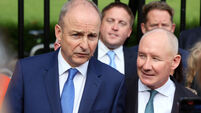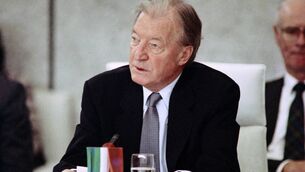It's not a good idea to mix sport and politics

LeBron James of the Los Angeles Lakers gestures to the referee during the fourth quarter against the Portland Trail Blazers at Moda Center in Portland, Oregon, last Thursday. Picture: Alika Jenner/Getty Images
The Lyft taxi driver urged his car through the late evening Los Angeles traffic, expertly manoeuvring around slower obstacles. His car radio crackled as a L.A. Lakers radio announcer excitedly followed LeBron James play-by-play around some distant basketball court. Even at 40 years-old, the legend was matching his age with a 40-point winning performance against the Portland Trail Blazers.
The audio backdrop of a radio, instead of a smartphone-linked playlist, took me back to my father listening to GAA football or hurling games, while we kids were ordered to enjoy the shivering seaside of Enniscrone or Ross on the odd Irish summer's day of blue skies. Drifting out the open window of our converted Nissan Vanette, the iconic voice of Mícheál Ó Muircheartaigh conjured up distant football warriors battling to the swelling roars of partisan crowds, while my father scanned the Sunday newspaper and dragged air in through each Benson and Hedges cigarette.
Our driver - his large frame pressed against the car door as he willed the traffic forward - was determined to deliver my wife and I from Union Station in downtown Los Angeles to our Glendale home as fast as he could. A man of few words, only an odd grunt of approval gave the indication he was actually listening to the game, but he was most certainly listening, especially when Le Bron James plucked a series of unlikely balls out of the ether and slammed them through the hoop to single-handedly deny his opponents a win.
The basketball veteran is reportedly a billionaire, yet still has the motivation to set record-setting performances. James loves basketball and believes: "I still got a lot to give to the game, to give to my teammates, to give to this league for while I’m here. I don’t have much time left." His commitment to the L.A. Lakers is clearly one of the reasons such fans as our Lyft driver is tuning in to listen to the games. But is it the only reason I wondered as he dropped us off to our home in record time.
‘Taking the knee’ in American sport is a simple but powerful act of protest, where athletes drop to one knee during the national anthem to highlight racial injustice and police brutality. It was made famous by NFL quarterback Colin Kaepernick in 2016, who, instead of standing for the anthem, knelt in silent defiance - a gesture that sent right-wing commentators into fits of patriotic outrage, claiming it disrespected the American flag, while left-wing liberals applauded the athletes for taking this public political stance.
LeBron James has also been a vocal supporter of athletes using their platform to protest racial injustice, including taking the knee. He backed Kaepernick’s right to protest, though he personally continued standing for the anthem at the time. However, as the controversy grew - and especially after the murder of George Floyd in 2020 - James took a stronger stance, joining fellow NBA players in kneeling during the anthem and calling out critics.
Yet, such activism in American sport has turned off many supporters, leading to a noticeable decline in event attendances and viewership. A 2021 YouGov/Yahoo News poll revealed that 45% of sports viewers altered their watching habits due to political and social justice protests in sports. Of those, 34.5% reported watching less because of messaging around racial injustice, while only 11% watched more sports broadcasts due to the increased focus on activism. While some fans embraced athletes using their platform for change, a significant portion felt that sports should remain a politics-free escape, leading to noticeable dips in viewership, particularly for leagues like the NBA and NFL, which were at the forefront of such protests.
Yet, not all who tuned out are stereotypical die-hard MAGA voters of Donald Trump’s campaign. I joined a recent entertainment industry event and fell into an animated conversation about which football team is hated the most (spoiler alert – it’s the Philadelphia Eagles, earning unanimous enmity from everybody there). Not knowing anything of American sports, in my attempt at relevance, I wondered if Covid had ushered in any changes there and was met with energetic agreement that baseball, football and basketball had all suffered since that tumultuous era, but not from Covid per se.
A voice-over artist told me that his Dad was a trenchant football supporter all his life (of the Chicago Bears) with his home decorated with team memorabilia and attending all the local games. However, since 2020 he has abandoned his team completely, sadly concluding that "politics has no place in sport".
A producer admitted that his addiction to baseball was suddenly broken when he went ‘cold-turkey’ during the Covid-induced halting of games and he never rekindled his old passion. Yet he attributed his lack of recent interest in baseball and football due to the sports having become so political, noting: "For me, and I know many other people, sport was always this safe space away from politics where we could enjoy something with others and it didn’t matter who you voted for. Now it is just an extension of the general division in society."
An actor friend agreed. For him, sport is just now another public space infected with the bitterness of culture wars.
None of those whom I met there were Trump supporters; in fact, the opposite. Yet all agreed that the activism of rich athletes like Kaepernick and James had turned them off watching their respective sports.
During the Irish War of Independence, the Gaelic Athletic Association walked a tightrope, balancing its nationalist identity with a carefully maintained apolitical stance. Many of its leaders were ardent republicans yet they ensured the association never made direct political declarations, shielding it from British suppression.
While GAA clubs quietly became meeting points for IRA volunteers and Croke Park itself bore witness to the horrors of Bloody Sunday in 1920, the GAA leadership framed such events as attacks on Irish sport rather than provocations to revolution. By emphasising cultural nationalism - banning ‘foreign games’ like soccer and rugby - while steering clear of formal political endorsements, they preserved the association as a safe yet defiant space for Irish identity.
This strategic neutrality allowed it to survive the war intact. Following the subsequent Civil War, the non-partisan GAA is credited as holding a bitterly divided Irish society together, encouraging rapprochement of both warring sides through participation and support in its games.
Clearly, the amateur GAA of one hundred years ago in Ireland is a universe away from the professional organisations of NFL, NBA and MLB in today’s USA. But has the cost of liberal activism in American sport been worth the media attention? Or has it removed another ‘apolitical public square’ where people of all opinions can safely mingle and enjoy each other’s company?





